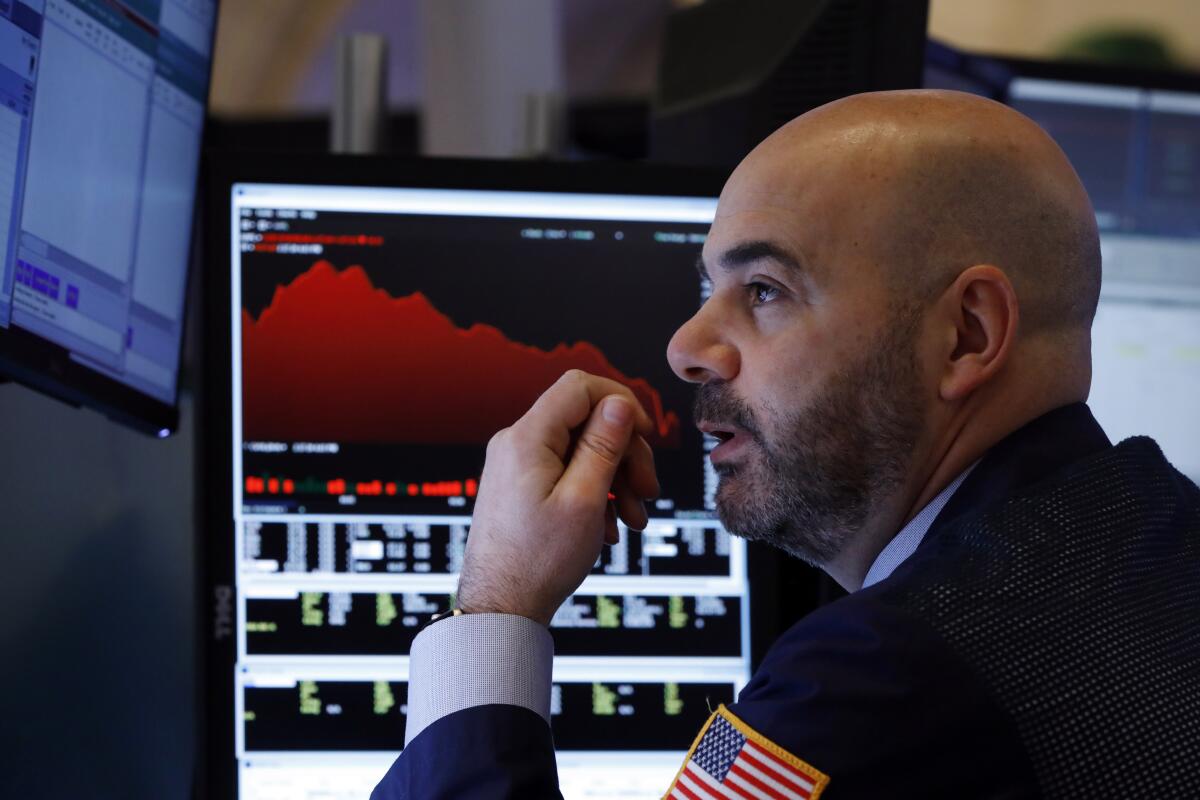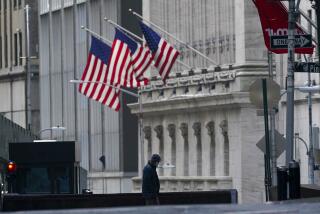U.S. stocks fall again, capping worst week since financial crisis of 2008

- Share via
If there is perhaps one thing that investors don’t like above all others, it’s uncertainty. And that’s what was served up in heaping bucketfuls this week as it became clear the coronavirus wouldn’t bypass the U.S. — with the stock market turning in its worst performance since last decade’s financial crisis.
While the market limited its losses Friday in the last 15 minutes of trading, as some buyers decided to pick up stocks on the cheap, the small rally couldn’t erase the carnage of the prior days, when the market dropped more than 10% in record time — into what is called “correction territory.” The last time that occurred was in late 2018, as a tariff war with China was escalating
“I think the operative word is fear. We got questions from clients about what should we do,” said Matthew Lui, vice president of investment research at Canterbury Consulting, a Newport Beach firm that provides advice to endowments, foundations and high-net-worth families. “It’s been a very volatile week. Our inboxes got bombarded.”
The week’s damage from the almost relentless selling was eye-popping.
The Dow Jones Industrial Average — which hit a record high of 29,551.42 just weeks ago on Feb. 12 — fell 3,583 points, or 12.4%. Microsoft and Apple, the two most valuable companies in the S&P 500, lost a combined $300 billion. In a sign of the severity of the concern about the possible economic blow, the price of oil sank 16%.
The latest losses have wiped out the S&P 500′s gains going back to October. The benchmark index is still up 6.1% over the past 12 months, not including dividends.
To get a sense of how fast conditions changed this week, consider that Fed Vice Chairman Richard H. Clarida, speaking Tuesday at a Washington economic conference, said that the central bank’s current monetary policy was in a “good place.” That essentially repeated comments made by Fed Chairman Jerome H. Powell two weeks earlier suggesting it was “way too early” to talk about lowering interest rates.
Yet by midday Friday, the Fed issued a statement that the “coronavirus poses evolving risks to economic activity” and that the central bank “will use our tools and act as appropriate to support the economy.” That was widely interpreted as a possible emergency rate cut at the Fed’s next meeting in mid March.
Global financial markets have been rattled by the virus outbreak that has been shutting down industrial centers, emptying shops and severely crimping travel all over the world. More companies are warning investors that their finances will take a hit because of disruptions to supply chains and sales. Governments are taking increasingly drastic measures as they scramble to contain the virus.
“A Fed interest rate cut won’t make sick people well, it won’t get consumers worried about getting sick to go to restaurants or the movies, and it won’t fix the disruption in global supply chains. However, it will pander to markets and that is often all the reason the Fed needs. The only question is if they can wait until the March 18 meeting or if they do so beforehand,” said Greg McBride, chief financial analyst at Bankrate.com.
Still, he cautioned, investors should not panic, noting that the market was still higher than it was in August.
“Whether Monday is another market drubbing or not will depend on the headlines that come out over the weekend. Lower prices will eventually bring out the bargain hunters, but we’ll need to see some clarity on the economic impact before a sustained rebound can take hold,” he said.
Most investors, though, didn’t seem interested in entertaining the notion of a sustained rebound quite yet, though the tech-heavy Nasdaq actually gained a single point — which means at least it didn’t lose any more ground.
Instead, there was a classic flight to safety as they bought bonds, pushing up the price and lowering the expected yield on a 10-year Treasury note to 1.14% from 1.3% late Thursday. That’s a record low, according to TradeWeb, and does signal good news for borrowers since the yield is a benchmark for home mortgages and other consumer loans.
The sell-off follows months of uncertainty about the spread of the virus, which hit China in December and shut down large swaths of that nation by January. China is still the hardest hit country and has most of the 84,000 cases worldwide and related deaths.
Nearly 60 nations representing every continent, except Antarctica, have confirmed cases. The virus outbreak has prompted a wide range of reactions from nations hoping to contain its spread and economic impact. The Geneva auto show was canceled as Swiss authorities banned large events of more than 1,000 people. Parts of Italy’s northern industrial and financial center remain under quarantine.
Airlines have suffered some of the worst hits as flight routes are canceled, along with travel plans. Big names like Apple and Budweiser brewer AB InBev are part of a growing list of companies expecting financial pain from the virus. Dell and athletic-wear company Columbia Sportswear are the latest companies expecting an impact to their bottom lines.
Cruise operators have also been hard hit, with shares sinking 30% or more as shipboard infections rose. But those companies were having a far better day Friday, with some on Wall Street believing that the sell-off was overdone. Shares of Royal Caribbean Cruises rose 4.4%, while Norwegian Cruise Line Holdings gained 7.3%. Carnival’s shares climbed 5.1%.
The Trump administration would like to see more of that sort of buying. Trump’s top economic advisor, Larry Kudlow, on Friday encouraged long-term investors to get back into the market or increase their positions.
“Our threat assessment is low and the economy is fundamentally sound,” he said in an interview on Fox Business Network, adding he believes “the market has gone too far” and investors “should not overreact.”
Indeed, analyst Lui at Canterbury Consulting, said the firm was keeping an eye out for possible bargains for its clients should the news reports indicate that the virus will not spread exponentially but rather be contained at some level.
“It’s potentially an opportunity to rebalance a portfolio toward stocks that are much cheaper then they were a week ago,” he said. “The two main things are not to panic and make extreme changes.”
John Bollinger, president of Bollinger Capital Management Inc. in Redondo Beach, said that worries of the virus spreading have been fanned by social and traditional media and any hint that the outbreak won’t be as bad as feared could entice buyers who had already been sitting out the market.
“We went into this rally with a huge amount of money on the sidelines already. I think that could come surging in here with just a hint that the outlook of the coronavirus is not as bad as it is,” he said.
The Associated Press and Bloomberg News contributed to this report.
More to Read
Inside the business of entertainment
The Wide Shot brings you news, analysis and insights on everything from streaming wars to production — and what it all means for the future.
You may occasionally receive promotional content from the Los Angeles Times.











